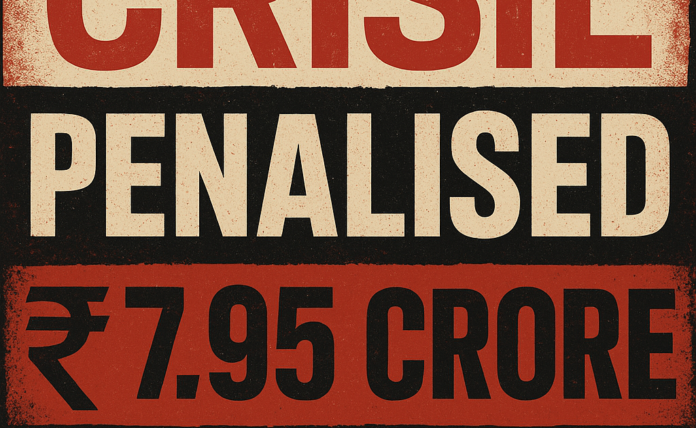[ad_1]
Chennai, 27 July 2025 — Crisil Limited, one of India’s leading credit rating and analytics firms, has been slapped with a penalty of ₹7.95 crore by the Tamil Nadu Goods and Services Tax (GST) authorities for alleged non-compliance in the export of services during the financial year 2020–21.
The penalty, issued under Section 74 of the Central Goods and Services Tax (CGST) Act, 2017, was communicated to Crisil by the State Tax Officer of the Mandaveli Assessment Circle in South Chennai. The penalty order pertains to GST obligations linked to services exported without adherence to the prescribed procedures under GST law.
Understanding the Case
🔍 What Triggered the Penalty?
Under the GST regime, the export of services is a zero-rated supply, meaning exporters are not liable to pay GST on outward services. However, this exemption is subject to stringent documentation and procedural compliance:
-
Filing of Letter of Undertaking (LUT) to export without payment of tax.
-
Accurate declaration of such exports in GSTR-1 and GSTR-3B returns.
-
Maintaining evidence of receipt of convertible foreign exchange within the prescribed time.
-
Avoiding any misclassification or concealment in tax returns.
The GST authorities allege that Crisil failed to comply with these provisions, possibly by misreporting, procedural lapses, or claiming zero-rated benefits without satisfying conditions. The penalty amount of ₹7.94 crore was computed based on unpaid tax and interest, alongside a penalty for alleged suppression of facts under Section 74.
Crisil’s Response
Crisil acknowledged the receipt of the penalty order and, in a regulatory filing, stated that:
“The matter pertains to an assessment under Section 74 of the CGST Act for FY 2020–21. We are reviewing the order and will pursue the appropriate legal remedies. The order is not expected to have any material financial impact on the company.”
This implies that Crisil intends to appeal the order before the GST appellate authority or higher courts, challenging the interpretation or procedural findings made by the Tamil Nadu GST department.
Legal Framework: Section 74 of the CGST Act
Section 74 of the CGST Act, 2017, deals with cases involving tax evasion, fraud, or suppression of facts. If a taxable person is found to have wilfully misrepresented or suppressed material facts to avoid tax, this section empowers authorities to demand tax dues with interest and impose a penalty of up to 100% of the tax amount.
Unlike cases under Section 73 (which applies to non-fraudulent tax shortfalls), Section 74 carries more severe implications, including prolonged litigation and reputational concerns.
Implications for the Industry
✅ Compliance Clarity
The Crisil case serves as a wake-up call to the service export sector. While many companies rely on zero-rating benefits, they often overlook the strict documentary compliance required under the law.
✅ Scrutiny of Export Claims
GST departments across states have stepped up audits of Input Tax Credit (ITC) refunds and export claims, especially in sectors like IT/ITeS, consulting, and analytics, where service exports form a bulk of the revenue.
✅ Need for Legal Vigilance
Firms must ensure meticulous GST filing, legal vetting of cross-border contracts, and regular reconciliation of export invoices with returns to avoid similar penalties.
Conclusion
The ₹7.95 crore penalty imposed on Crisil underscores the growing vigilance of GST authorities and the complexity of the tax regime, even for reputed firms. While Crisil plans to legally contest the order, the case highlights how procedural lapses or interpretational issues in the export of services can lead to substantial tax liabilities. The outcome of this case may set a precedent for future assessments and deepen the discussion around GST treatment of cross-border services.
For legal professionals and businesses engaged in service exports, this case is a timely reminder to ensure watertight compliance, maintain accurate documentation, and stay updated with evolving GST jurisprudence.
[ad_2]
Source link


